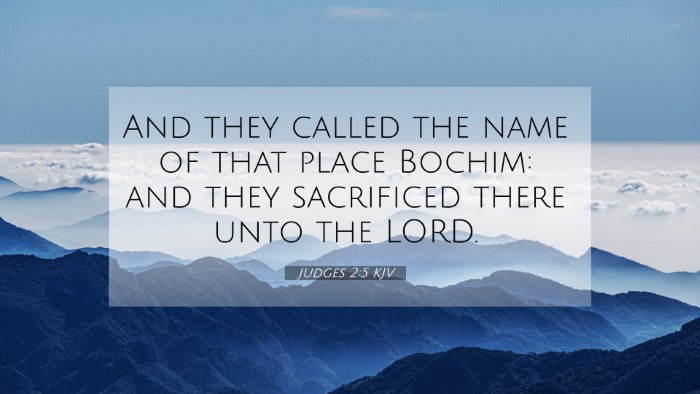Old Testament
Genesis Exodus Leviticus Numbers Deuteronomy Joshua Judges Ruth 1 Samuel 2 Samuel 1 Kings 2 Kings 1 Chronicles 2 Chronicles Ezra Nehemiah Esther Job Psalms Proverbs Ecclesiastes Song of Solomon Isaiah Jeremiah Lamentations Ezekiel Daniel Hosea Joel Amos Obadiah Jonah Micah Nahum Habakkuk Zephaniah Haggai Zechariah MalachiJudges 2:5 Similar Verses
Judges 2:5 Cross References
And they called the name of that place Bochim: and they sacrificed there unto the LORD.
Uncover the Rich Themes and Topics of This Bible Verse
Listed below are the Bible themes associated with Judges 2:5. We invite you to explore each theme to gain deeper insights into the Scriptures.
Judges 2:5 Cross Reference Verses
This section features a detailed cross-reference designed to enrich your understanding of the Scriptures. Below, you will find carefully selected verses that echo the themes and teachings related to Judges 2:5 KJV. Click on any image to explore detailed analyses of related Bible verses and uncover deeper theological insights.

Genesis 35:8 (KJV) »
But Deborah Rebekah's nurse died, and she was buried beneath Bethel under an oak: and the name of it was called Allonbachuth.
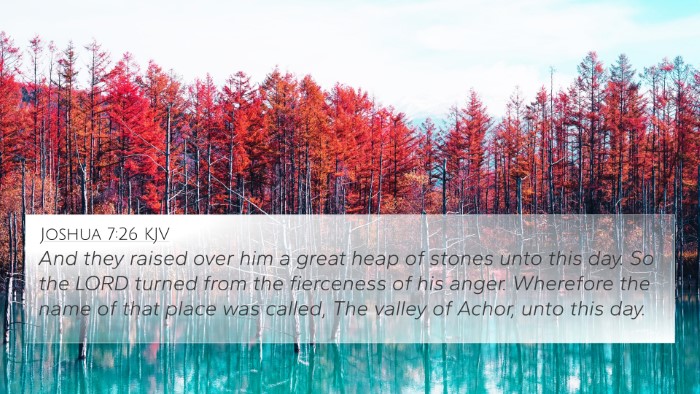
Joshua 7:26 (KJV) »
And they raised over him a great heap of stones unto this day. So the LORD turned from the fierceness of his anger. Wherefore the name of that place was called, The valley of Achor, unto this day.
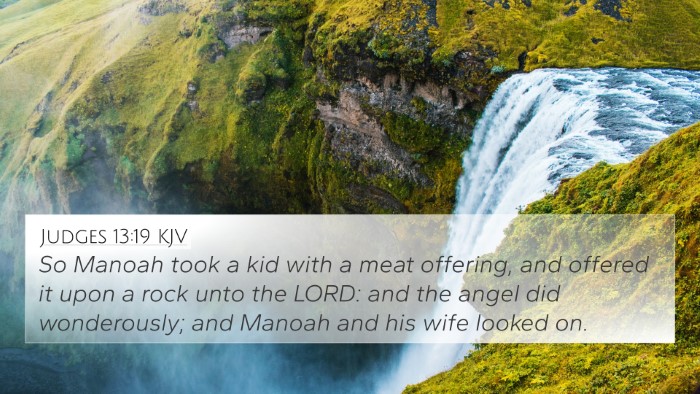
Judges 13:19 (KJV) »
So Manoah took a kid with a meat offering, and offered it upon a rock unto the LORD: and the angel did wonderously; and Manoah and his wife looked on.
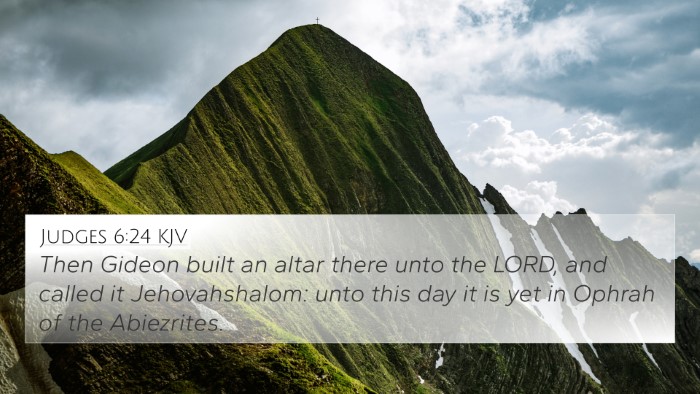
Judges 6:24 (KJV) »
Then Gideon built an altar there unto the LORD, and called it Jehovahshalom: unto this day it is yet in Ophrah of the Abiezrites.
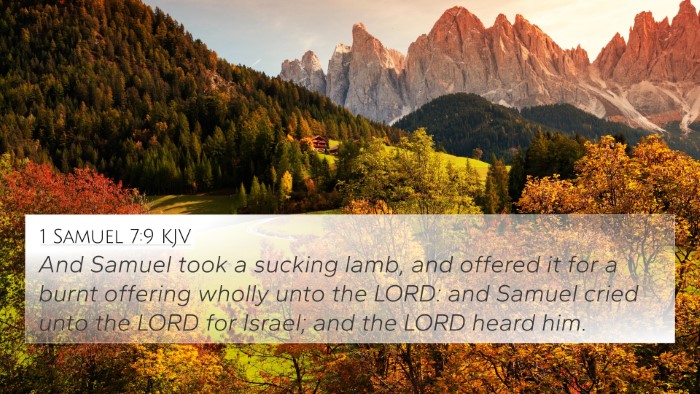
1 Samuel 7:9 (KJV) »
And Samuel took a sucking lamb, and offered it for a burnt offering wholly unto the LORD: and Samuel cried unto the LORD for Israel; and the LORD heard him.
Judges 2:5 Verse Analysis and Similar Verses
Understanding Judges 2:5
Judges 2:5 states: "And they called the name of that place Bochim: and they sacrificed there unto the LORD." This verse marks a significant moment in Israel’s history, occurring after the death of Joshua, where the people of Israel express their sorrow and commitment to the Lord. Below, we explore its meaning through insights from public domain commentaries by Matthew Henry, Albert Barnes, and Adam Clarke.
Summary of Judges 2:5
This verse captures the Israelites’ reaction to the reminder of God’s covenant and their failures after settling in the Promised Land. They name the place "Bochim," meaning "weeping," reflecting their remorse for having disobeyed God and turned to idolatry. The act of sacrifice indicates their desire to restore their relationship with Yahweh.
Commentary Insights
-
Matthew Henry:
Matthew Henry explains that this moment signifies a pivotal return to God, where the Israelites acknowledge their unfaithfulness and seek reconciliation. The name "Bochim" reminds them of God's relentless commitment to His people, despite their transgressions.
-
Albert Barnes:
Albert Barnes highlights that the name "Bochim" signifies a genuine emotional response. The sacrifices made there reflect a physical and spiritual act of re-dedication to God, emphasizing a need for repentance in light of their disobedience.
-
Adam Clarke:
Adam Clarke elaborates on the significance of the location, noting that it serves as a constant reminder of God’s demands for holiness and fidelity among His chosen people. Clarke also emphasizes the importance of community acknowledgment of sin and collective repentance.
Bible Cross-References
Judges 2:5 connects with several other scripture passages that shed light on similar themes of repentance, covenant, and relationship with God. Here are some key cross-references:
- Deuteronomy 30:2: This verse emphasizes the need for the Israelites to return to God with all their heart and soul.
- 1 Samuel 7:6: Here, the Israelites gather to lament and seek God's favor, paralleling their actions at Bochim.
- 2 Chronicles 7:14: A clear call to humbling and seeking God, similar to the repentance displayed at Bochim.
- Psalm 51:17: A reminder that God desires a broken spirit and a contrite heart, aligning with the weeping of the Israelites.
- Hosea 6:1: An invitation to return to the Lord, encapsulating the essence of the Israelites' response at Bochim.
- Hebrews 12:1: Encouragement to lay aside weights and sin, resonating with Israel's need to forsake idolatry.
- Romans 2:4: The kindness of God leading to repentance, a reflection of God's mercy in the face of Israel’s sin.
- James 4:8: A call to draw near to God, which mirrors the Israelites' desire to restore their relationship with Him.
- Revelation 2:5: A warning to the church of Ephesus to remember their first love and repent, similar to Israel’s need for renewal.
- Acts 3:19: Peter calls the people to repentance, reflective of the Israelites' actions in Judges 2:5.
Thematic Connections
Judges 2:5 not only stands alone but is also interwoven with a larger narrative of divine forgiveness and the human condition. The themes of repentance, restoration, and covenant are prevalent throughout the scriptures, showcasing God's unchanging nature in dealing with His people.
Exploring Inter-Biblical Dialogue
The naming of Bochim serves as a point of reflection for biblical scholars in understanding the nature of God’s relationship with Israel. It prompts us to consider:
- What it means to be in covenant with God.
- The significance of public acknowledgment of sin.
- The importance of community in spiritual restoration.
- How God uses moments of sorrow to draw His people back to Him.
Practical Application
In light of Judges 2:5, believers today are encouraged to:
- Reflect on personal and communal faithfulness to God.
- Engage in collective repentance where sin is recognized.
- Utilize tools for cross-referencing to deepen their understanding of scripture themes.
- Employ a Bible concordance or cross-reference guide to discover related verses for deeper study.
Conclusion
Judges 2:5 encapsulates a crucial moment of weeping and repentance within the broader narrative of Israel’s history. Through the insights and themes discussed, it serves as a timeless reminder of God's call for His people to return to Him and the importance of understanding our connection to the scriptures through cross-referencing and related themes.


